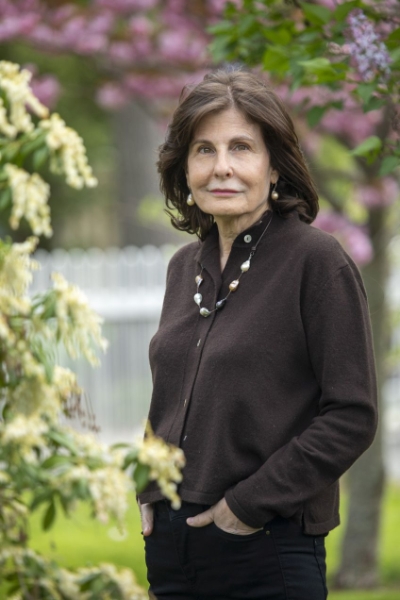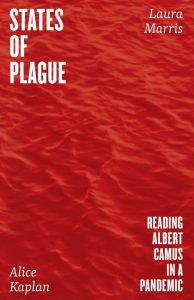Read an Excerpt from “States of Plague” by Alice Kaplan and Laura Marris
In their new book, States of Plagues: Reading Albert Camus in a Pandemic, Alice Kaplan and Laura Marris examine Camus’s novel as a palimpsest of pandemic life, an uncannily relevant account of the psychology and politics of a public health crisis. Both personal and eloquently written, this book uncovers for us the mysterious way a novel can imagine the world during a crisis and draw back the veil on other possible futures. In this excerpt, Alice Kaplan explores the relationship between separation and communication in The Stranger and the odd forms of separation mediated by technology that we rely on today.
Les séparés—Alice
At first, Camus wanted to call The Plague “Les separes”— the separated ones. Separation was always Camus’s own shadow theme, but for a long time, all its twists and turns seemed remote to me.
I was in Paris when the city began its first official confinement, Tuesday, March 17, 2021, at noon. I set out at eleven to get a last walk in the Luxembourg Gardens, but it was too late; the park gates were already padlocked. Crossing the boulevard Raspail, I saw a florist carrying all his bouquets to the sidewalk. “Take them or they’ll die,” he said to no one in particular, “I’m closing in a few minutes.” Passersby swooped down to grab their free flowers. They looked like panicked birds, pecking at the last blossoms. I remembered a story Roger Grenier had told me, about the men in his army unit in June 1940, standing at attention in a muddy field as their commanding officer announced the defeat of France. The men were crying and now so was I. Not weeping, but feeling the tears well up.
The night before, I’d watched the French president’s speech, in which each new pronouncement began with the refrain “We’re at war”:
We’re at war. All actions of the government and the parliament must now turn toward the combat against the epidemic. Day and night, nothing must distract us.
Camus created his plague allegory to turn the experience of war into a disease. Now, in a reverse allegory, President Macron was making the experience of disease into a war. As
warriors, we would all need to download a form for permission to go to the pharmacy or the grocery store. The martial rhetoric didn’t quite work. The French word confinement (with its antonym deconfinement) is gentler than the American “lockdown,” but it’s still a separation from the world, an isolation rather than a battle.
Separation is a slow, steady beat in The Plague, not only a theme that Dr. Rieux will analyze in his plague chronicle but a motor for the plot and a maker of images, present in the smallest gestures of his characters. “And so each person had to agree to live day by day,” he writes, “facing the sky alone.”
Camus decides early on to foreground the way quarantine tears people apart. He experiments with a passage in his notebooks, describing two kinds of separation that are linked. The whole city is separated from the world, and the people are separated from their loved ones: “And now probably it was not enough to be separated from the world itself, the plague still had to separate them from their modest daily creations. After blinding their minds, it tore out their hearts.” Then he makes a practical decision about his book in progress: “There are nothing but solitary men in the novel.” In the end that wasn’t strictly true, but for Camus, a world with few women is a bleak place where romantic love is reduced to longing.
Separation, from the time he drafted the novel to its publication, was also the driving force of Camus’s own experience. In November 1942, he was living in the mountainous region of central France, near Lyon— the Massif Central. He had traveled there in August from Algeria for treatments for his tuberculosis, which had flared up badly after the publication of The Stranger. His wife, Francine, had come with him, but in early October she needed to return to Algeria for her teaching job. On November 8, the Allies invaded North Africa, and Algeria was cut off from mainland France for the rest of the war. Algeria became Allied territory, while France, which once had a so-called free zone, was now entirely occupied by the retaliating Nazis. There was no more free zone, no more travel, no more mail service between Allied North Africa and Nazified France. Camus had missed the last boat to Algeria. He couldn’t even send a letter home.
Back in Oran, on New Year’s Eve of 1942, Francine wrote to a friend in New York:
This year’s end finds me here with the Americans, while my husband is in France, unable to join me. I haven’t had any news from him since November 11. We haven’t had any luck. I believe Jeanne Terraccini told you that my husband had a relapse of his illness at the end of January. It was a low blow for him. But he has a great deal of courage. He went through another round of treatments and this summer we left for France so he could take a mountain cure. I left him in October to organize our life in Algiers for the winter (We had decided to move to Algiers). He was supposed to recuperate in France until the end of November. He was about to reserve a seat on the boat to come back when the Americans landed in Algeria. He would have been so happy to have been here.
Clearly we were foolish. We wanted to act as if the war didn’t exist. And the war has separated us.
On November 11, the day Francine received her husband’s last letter, he wrote in his notebook: “Trapped like rats.” Separated, but also trapped. In The Plague, Camus reverses the geography of husband and wife: Dr. Rieux is trapped in Oran, and his wife leaves for the mainland, to take a cure in a sanatorium. She doesn’t survive.
Dr. Rieux waits for his wife quietly, mournfully, as if he already senses she won’t return. When the gates are closed, Rambert, a Parisian journalist who has come to Oran to file an investigative report on public health in the Arab neighborhoods, is trapped along with everyone else. He makes a deal with some shady characters on the waterfront to get out of the city. But at the last moment, in a dialogue carefully crafted by Camus, he decides to stay and joins the public health squads who are fighting the plague.
Rieux’s separation from his wife at the train station at the start of the novel and Rambert’s reunion with his partner at the end are bookends that express the strangeness of both separation and reunion. Camus didn’t put much faith in perfect reunions. He wrote in Combat, in a June 1944 editorial: “Separation seems to me to be the rule and reunion only the exception.”
In The Plague, when Rieux bids farewell to his wife:
He pressed her against him, and on the platform now, from the other side of the window, all he could see was her smile. “Please,” he said, “take care of yourself.” But she couldn’t hear him.
Dr. Rieux holds his wife in his arms, and in the space of a single sentence, he’s on the other side of the train window, standing on the quai. Camus expresses Rieux’s grief with the image of a glass barrier that always reminds me of the philosophical version of the same image in The Myth of Sisyphus: “A man is talking on the telephone behind a glass partition; you can’t hear him, but you see his incomprehensible dumb show; you wonder why he’s alive.”
The separated lovers are silenced by the glass that comes between them like grief, while the man watching the pantomime in the phone booth doesn’t feel much of anything except his own incomprehension. Both scenes take me back to the first months of the virus, to my separation from my friends, my students, and to the first courses I taught by Zoom. When you say goodbye to someone in the world, you get to watch them walk away, or get in a car, or weave through the security line in the airport until you can’t see them anymore. In Zoom it’s not quite sudden death. At the end of class, there’s a brief second when the images of the students’ faces freeze before disappearing in a flash. I want to run my index finger over the screen as if I could coax them back. Disbelief: we were talking, and then they were gone. By now, this way of parting has become familiar to me. Zoom loneliness, I call it, or in darker moments, Zoom death.
In Camus’s novel, the problem of separation doesn’t end with the end of the plague. When Rambert welcomes his true love at the same train station where Rieux said goodbye to his wife, he is crying too hard to know if the form he’s embracing—“the form running towards him”—is still the person he knew. There’s a sense of danger in every reunion: Can the loved one be the same after a time of absence, or are all reunited lovers at risk of finding a stranger?
Camus didn’t see Francine Camus for two years. But life went on. On D- Day, when Parisians were celebrating the allied landing in Normandy, Camus met the actress Maria Casares. Their connection was immediate, intense. In October, his wife finally got a boat to mainland France to join her husband. Camus and Casares separated.
On June 6, 1948, the exact anniversary, to the day, of their first meeting on D-Day, he and Maria Casares crossed paths on the boulevard Saint- Germain. The filmmaker who makes this movie will have to decide where along that long street they meet: the Bac metro stop near Gallimard, the Cafe de Flore, the Odeon metro? Camus had just published The Plague, which was a runaway success. His twins were four years old. Maria had a new lover. I try to imagine them walking toward one another, the opposite of Orpheus and Eurydice, about to reunite for the rest of their lives.
In his December 1944 editorial in Combat, two months after Francine’s return, Camus took stock of the situation. “Nostalgic longing, broken loves, ghostly dialogues carried on across the plains and mountains of Europe or sterile monologues conducted in the mind of one person awaiting reunion with another— such are the signs of these wretched times.” Again in spring, as the prisoners of war and deportees began to return to France, Camus remarked that the more private victory at war’s end was the victory of the couple against separation. The sentiment reappears in his notebooks: “80% divorce among repatriated prisoners of war. 80% of human loves do not resist five years of separation.”
The ways and means of separation and communication during the current pandemic would have been inconceivable to anyone in Camus’s generation, yet the deep processes he describes have helped me understand strange postmodern forms of separation mediated by technology. How many lovers have been separated, how many “ghostly dialogues” have been carried on across the globe on Zoom or FaceTime?

Alice Kaplan is the Sterling Professor of French and Director of the Whitney Humanities Center at Yale University. She is coauthor of States of Plague, with Laura Marris, and author of French Lessons, Looking for “The Stranger,” and Dreaming in French, all also published by the University of Chicago Press. She has been a finalist for both the National Book Critics Circle Award and the National Book Award. She lives in Guilford, Connecticut.
States of Plague is available now from our website or your favorite bookseller.
